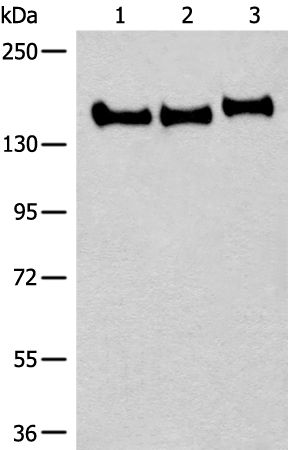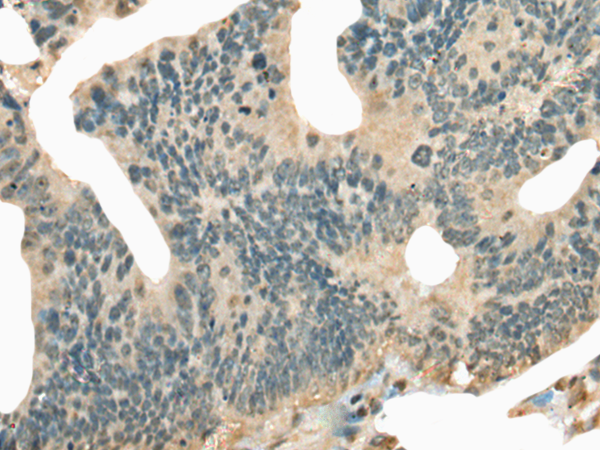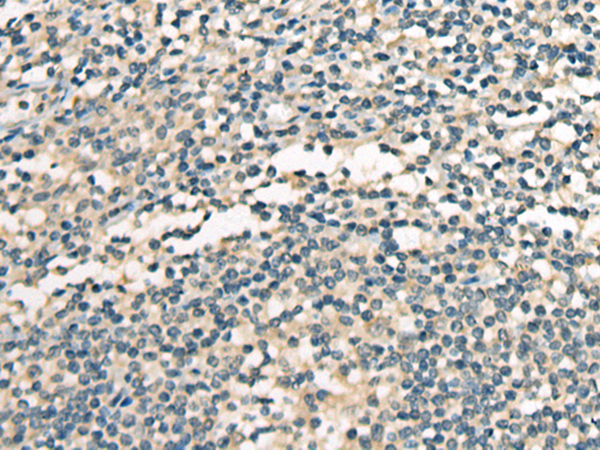


| WB | 咨询技术 | Human,Mouse,Rat |
| IF | 咨询技术 | Human,Mouse,Rat |
| IHC | 1/20-1/100 | Human,Mouse,Rat |
| ICC | 技术咨询 | Human,Mouse,Rat |
| FCM | 咨询技术 | Human,Mouse,Rat |
| Elisa | 1/5000-1/10000 | Human,Mouse,Rat |
| Aliases | CDFE; NRXN4; AUTS15; CASPR2; PTHSL1 |
| WB Predicted band size | 148 kDa |
| Host/Isotype | Rabbit IgG |
| Antibody Type | Primary antibody |
| Storage | Store at 4°C short term. Aliquot and store at -20°C long term. Avoid freeze/thaw cycles. |
| Species Reactivity | Human, Mouse, Rat |
| Immunogen | Fusion protein of human CNTNAP2 |
| Formulation | Purified antibody in PBS with 0.05% sodium azide and 50% glycerol. |
+ +
以下是关于CNTNAP2抗体的3篇参考文献及其摘要内容:
---
1. **文献名称**: *"Caspr2. a new member of the neurexin superfamily, is localized at the juxtaparanodes of myelinated axons and associates with K+ channels"*
**作者**: Poliak, S., et al. (1999)
**摘要**: 该研究首次描述了CNTNAP2(接触蛋白相关蛋白2.又称Caspr2)在神经系统中的定位,发现其富集于髓鞘轴突的旁结区,并与钾离子通道结合。研究通过特异性抗体进行免疫组化和免疫沉淀实验,揭示了CNTNAP2在维持神经轴突电信号传导中的关键作用。
2. **文献名称**: *"Molecular cytogenetic analysis and resequencing of contactin associated protein-like 2 in autism spectrum disorders"*
**作者**: Bakkaloglu, B., et al. (2008)
**摘要**: 本文探讨了CNTNAP2基因变异与自闭症谱系障碍(ASD)的关联。研究利用抗CNTNAP2抗体进行Western blot和免疫荧光分析,发现ASD患者中CNTNAP2蛋白表达异常,并揭示了其与突触蛋白的相互作用,提示其在神经发育中的功能失调。
3. **文献名称**: *"Antibodies to the Caspr2/contactin-associated protein 2 in neurological syndromes: clinical and immunological characteristics"*
**作者**: van Sonderen, A., et al. (2016)
**摘要**: 该研究报道了抗CNTNAP2自身抗体在自身免疫性边缘性脑炎、莫旺综合征和癫痫患者中的临床意义。通过细胞免疫荧光和活体检测,发现这些抗体可靶向CNTNAP2蛋白的胞外结构域,导致神经元兴奋性异常,为相关疾病的免疫治疗提供了依据。
---
以上文献涵盖了CNTNAP2抗体的基础研究(定位与功能)、疾病关联研究(自闭症)及自身抗体在神经免疫疾病中的作用。如需进一步扩展,可检索近年关于CNTNAP2抗体在肿瘤或精神分裂症中的研究。
×